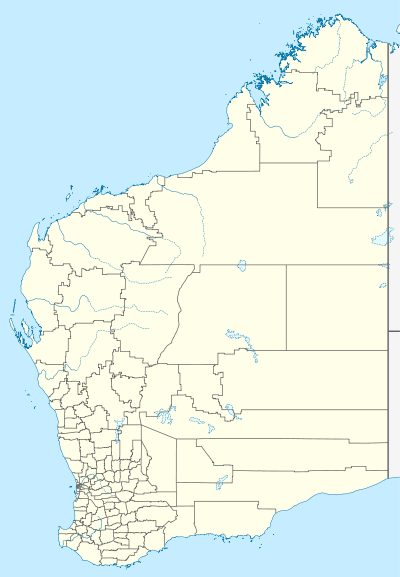Boyanup, Western Australia
| Boyanup Western Australia | |
|---|---|
 Boyanup General Store | |
 Boyanup | |
| Coordinates | 33°29′10″S 115°43′48″E / 33.48611°S 115.73000°ECoordinates: 33°29′10″S 115°43′48″E / 33.48611°S 115.73000°E |
| Population | 1,264 (2011 census)[1] |
| Established | 1894 |
| Postcode(s) | 6237 |
| Elevation | 40 m (131 ft) |
| Location | |
| LGA(s) | Shire of Capel |
| State electorate(s) | Collie-Preston |
| Federal Division(s) | Forrest |
Boyanup is a town on the South Western Highway in the South West agricultural region, 195 km south of Perth and 18 km south-east of Bunbury, Western Australia. The town is located on the Preston River.
Boyanup is an Noongar Aboriginal name, said to mean "a place of quartz" as "Boya" means "rock" or "stone".
The first European in the area was in December 1836 when Lieutenant Henry William Bunbury explored the route from Pinjarra to Busselton and thought it to be ideal for farming.[2]
In 1845 Dublin solicitor James Bessonnet took up Location 54 in the Wellington District, consisting of 385 acres through which the Preston River flowed and the new road from Bunbury to the Blackwood had just been completed. The land also had a natural spring, sometimes known as Bessonnet Springs, and a permanent billabong. Bessonnet named his farm Boyanup. Bessonnet left the colony in 1849 aboard the Despatch. Location 54 proved to be ‘too far from anywhere to be workable and eventually the bush took it back’.[3]
A road survey in 1869 shows the town name as "Boyinup". In 1894 the South Western Railway was completed from Perth through Boyanup to Bunbury. The Bunbury to Boyanup section was completed on 30 November 1887.[4] The townsite was gazetted in 1894.[5] A railway line extension between Boyanup and Bridgetown opened on 1 November 1898.[6]
The population of the town was 198 (103 males and 95 females) in 1898.[7]
The Yoganup North Mine site, closed in 1997, is owned by Iluka Resources, where mineral sands were mined and separated, is located 5.1 kilometres (3 mi) north-west of the town.[8]
References
- ↑ Boyanup Australian Bureau of Statistics
- ↑ Bunbury, Henry William (1930). W. St. Pierre Bunbury and W. P. Morrell, ed. Early days in Western Australia : being the letters and journal of Lieut. H. S. Bunbury, 21st Fusiliers. London: Oxford University Press.
- ↑ "Slab Hut, Boyanup Farm" (pdf). Register of Heritage Places - Assessment Documentation. Perth, WA: Heritage Council of WA. 17 November 2006. Retrieved 27 February 2015.
- ↑ "The Governor at Bunbury". The West Australian. Perth, WA. 30 November 1887. p. 3. Retrieved 27 February 2015.
- ↑ Western Australian Land Information Authority. "History of country town names – B". Retrieved 8 June 2007.
- ↑ "Boyanup Railway Precinct". inHerit - Our Heritage Places. Perth, WA: Heritage Council of WA. 8 February 2015. Retrieved 27 February 2015.
- ↑ "Population of Western Australia". Western Mail (Perth, WA : 1885 - 1954). Perth, WA: National Library of Australia. 22 April 1898. p. 23. Retrieved 28 May 2012.
- ↑ "Bonzle.com - Map of Boyanup, WA". 2008. Retrieved 29 August 2008.